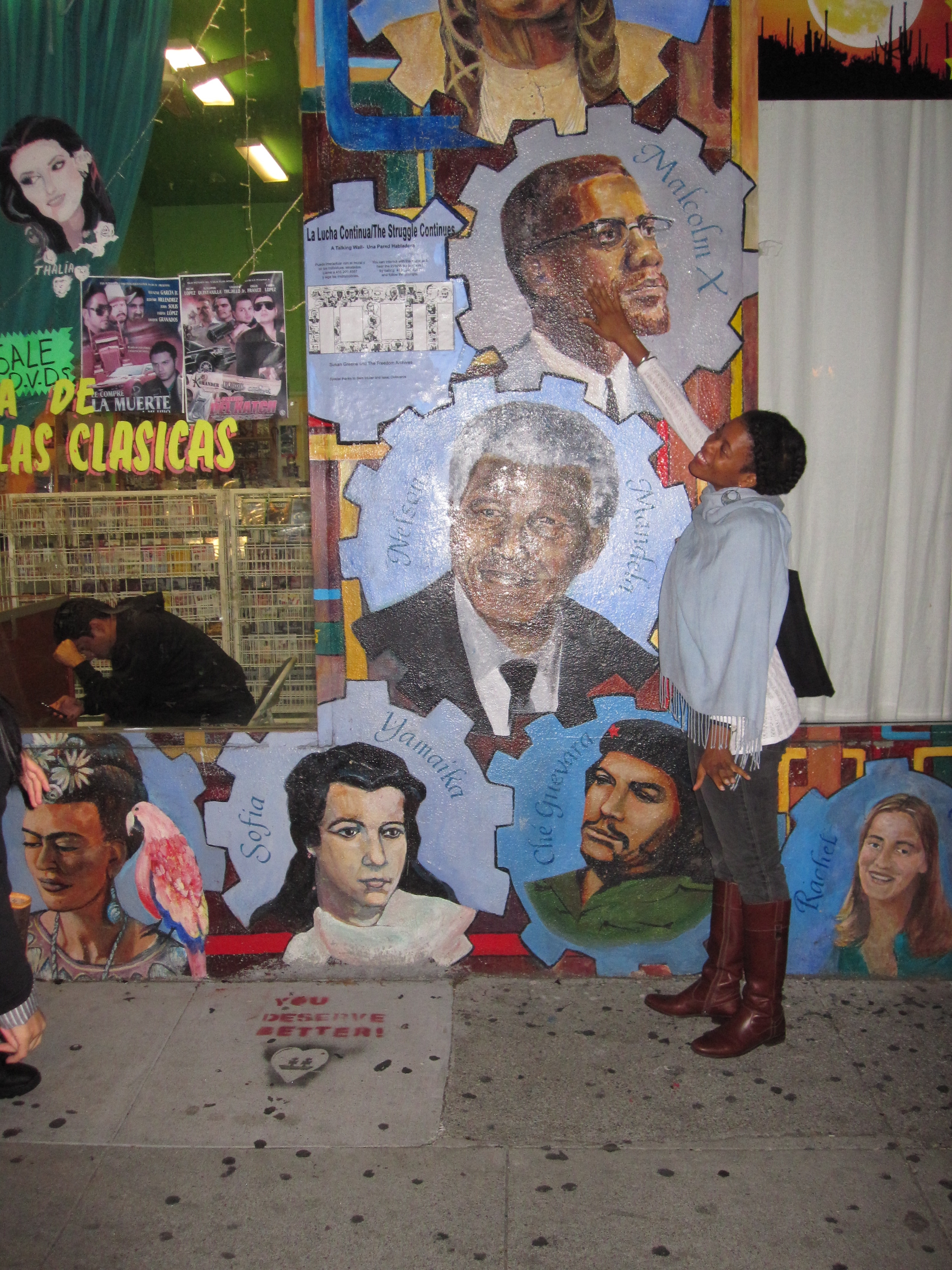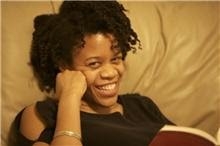A Writer's Life
"I think if people knew how hard we worked, they would pay us more." Enjoy the first tongue-in-cheek episode of A Writer's Life With Susan Juby.
Jump to navigation Skip to content
"I think if people knew how hard we worked, they would pay us more." Enjoy the first tongue-in-cheek episode of A Writer's Life With Susan Juby.
Social justice activist and Cave Canem fellow Ama Codjoe blogs about her work as a teaching artist with the P&W-supported Girls Educational Mentoring Services (G.E.M.S.), a New York City based organization that aims to support young women who have been commercially sexually exploited and domestically trafficked.
I teach social justice and poetry through asking myself the same big questions I pose to students. As a teaching artist I am invested both in my life as a teacher and in my life as an artist. These two pieces of my identity inform one another. When I assign the group a poem to write, I often do the assignment myself. While G.E.M.S. participants were interrogating what it means to be woman, I was asking myself similar questions in my artistic practice.
 The inspiration flows in both directions. Just as frequently as I find myself using my teaching practice to inform my artistic practice, I also bring strategies, poems, questions, and obsessions from my writing life back into the classroom. If I look back at periods when I have been teaching a particular group of students and then examine the poems that I wrote during that time I can often find traceable themes and continuities. For five weeks of teaching and five weeks of writing we seemed to return to these central questions: What do we invoke? What do we want? What do we dream?
The inspiration flows in both directions. Just as frequently as I find myself using my teaching practice to inform my artistic practice, I also bring strategies, poems, questions, and obsessions from my writing life back into the classroom. If I look back at periods when I have been teaching a particular group of students and then examine the poems that I wrote during that time I can often find traceable themes and continuities. For five weeks of teaching and five weeks of writing we seemed to return to these central questions: What do we invoke? What do we want? What do we dream?
To close our time together, young women who participated in the P&W-supported workshops read their poems at an art exhibit that also featured their visual art. Listening as their confidence, nervousness, clarity, and power filled the room, I was impressed by how these young women had turned to me, turned to each other, and turned to the page. The space where we write, discuss, reveal, and revel is a space of courage and power—is a political space. The work of self-reflection, writing, and creativity is worthy work, and as Audre Lorde insists, poetry is not a luxury. In other words the work of a poet is dangerous and life-changing work.
Photo: Ama Codjoe. Credit: Evelyn Bojorquez.
Support for Readings/Workshops in New York City is provided, in part, by public funds from the New York State Council on the Arts, and the Department of Cultural Affairs, with additional support from the Louis & Anne Abrons Foundation, the Axe-Houghton Foundation, the A.K. Starr Charitable Trust, and Friends of Poets & Writers.
This stop-motion animation was created by Lacey Meek, a tenth grader at Animas High School (AHS) in Durango, Colorado, for the AHS Poetry Exhibition "Curious Words & Coffee Stains."
It may be Ocho de Mayo, but it's not too late to watch Naomi Shihab Nye read her poem "Cinco de Mayo" (from Transfer, published by BOA Editions last year) for PBS NewHour's Weekly Poem.
A cento, Latin for "patchwork," is a poem composed entirely of fragments and lines taken from other poems and/or written sources. Try creating your own patchwork poem by incorporating lines from various poems in a poetry anthology. For inspiration, read David Lehman's cento in the New York Times.
For the month of May, social justice activist and Pushcart-nominated poet Ama Codjoe blogs about the P&W–supported workshop series she facilitates at Girls Educational & Mentoring Services (G.E.M.S.), an organization that provides opportunites for girls and young women who have been sexually exploited, and about participating in a P&Wsupported Cave Canem regional workshop in 2009.
G.E.M.S. is a New York City based organization whose mission is to support young women from the ages of 12–24 who have been commercially sexually exploited and domestically trafficked. Young women who receive support from G.E.M.S. often describe themselves as being “in the life."
 For five weeks in the fall of 2011, young women from G.E.M.S. showed up to write in community. We gathered around a table, asking unanswerable questions and drafting poems that were received with admiration, thoughtful critique, and applause. In my work as an educator, a student has never failed me. When it comes to poetry and writing, young people always have something to share—it is my job to provide a way for students to enter into a poem.
For five weeks in the fall of 2011, young women from G.E.M.S. showed up to write in community. We gathered around a table, asking unanswerable questions and drafting poems that were received with admiration, thoughtful critique, and applause. In my work as an educator, a student has never failed me. When it comes to poetry and writing, young people always have something to share—it is my job to provide a way for students to enter into a poem.
One entryway, Candy Chang's public art project “Before I Die,” urged us to develop lists of what we wanted to do or say before we died. We took our lists and turned them into poems that confided in our mothers, spoke to our children, cursed out good-for-nothings, and professed genuine love. We always filled the page. There was never enough time to write.
Through carefully crafted poems, young women from G.E.M.S. revised the phrase “in the life” to mean “in the life of our poetry,” “in the life of our innermost world,” and “in the life of our power.”
Photo: Ama Codjoe. Credit: Matthew Goldberg.
Support for Readings/Workshops in New York City is provided, in part, by public funds from the New York State Council on the Arts, and the Department of Cultural Affairs, with additional support from the Louis & Anne Abrons Foundation, the Axe-Houghton Foundation, the A.K. Starr Charitable Trust, and Friends of Poets & Writers.
This month's selection from Motionpoems is Adam Tow's visual interpretation of David Wagoner's poem "Thoreau and the Lightning," from the collection After the Point of No Return (Copper Canyon Press, 2011).
Last night we attended a unique book launch for New York City poet Elana Bell, featured in our May/June 2012 issue's "Winners on Winning" feature. Bell, who incorporated a dance performance and fund-raiser into the celebration of her debut collection, is the recipient of the 2011 Walt Whitman Award from the Academy of American Poets for Eyes, Stones, released in April by Louisiana State University Press.
When we interviewed Bell for our May/June article about the unexpected rewards of winning a book prize, she mentioned that she was using some of the prize money to realize an artistic vision. "Many of the poems in the collection are persona poems, in the voices of contemporary and historical characters who are inexorably linked to the land of Israel/Palestine," she said. "Sometime during the process of creating this book, I knew that I wanted to create a performance version based on the text. I wasn't sure what it would look like, but I knew it would be collaborative and somehow address the question: 'How can two narratives exist in one body?' When I found out I'd won the Whitman, I decided that rather than have a traditional book release party, I would create a performance piece with dancers and musicians addressing that question."
The piece premiered at a standing-room-only event that also included a silent art auction to benefit Just Vision, a nonprofit organization that promotes social justice in Israel and Palestine. A selection from the performance is featured in the video below.
[This article has been updated. An earlier version of this article failed to mention the sponsor for the Walt Whitman Award. The prize is given annually by the Academy of American Poets.]
Prairie Lights Bookstore opened its doors in 1978 as a small, intimate bookshop, and since then, it has grown to become a literary institution in Iowa City. Today the bookstore occupies three and a half floors, part of which serves as the coffeehouse Times Club. Prairie Lights, in conjunction with the University of Iowa Writers’ Workshop, hosts frequent readings and author events with visiting writers from around the world.

The Believer's May issue has arrived, and with it, the announcement of the magazine's literary awards for books of poetry and fiction published in 2011. The honors are given annually for poetry collections deemed by the magazine's editors to be "the finest and most deserving of greater recognition" and novels and short story collections that are the "strongest and most underappreciated of the year."
Massachusetts poet Heather Christle takes the second annual Believer Poetry Award for The Trees The Trees (Octopus Books), her "casually incandescent second collection." (Her third book, What Is Amazing, was released by Wesleyan University Press this past February.)
Author of three poetry collections himself, New York City author Ben Lerner receives the seventh annual Believer Book Award in fiction for his "hilarious and sensitive" debut novel, Leaving the Atocha Station (Coffee House Press). The book, which made it onto a number of best-of lists last year, was also a finalist for the Los Angeles Times Art Seidenbaum Award for First Fiction and the Young Lions Fiction Award given by the New York Public Library.
Along with the winner announcements, the Believer also released a list of the books most nominated for shout-outs in its readers survey. Coming out on top in poetry are Tracy K. Smith's Pulitzer Prize-winning collection, Life on Mars (Graywolf Press), Dean Young's Fall Higher (Copper Canyon Press), and Carl Phillips's Double Shadow (Farrar, Straus and Giroux), which won this year's Los Angeles Times Book Prize in poetry. In fiction, readers' most frequent picks were The Art of Fielding (Little, Brown) by Chad Harbach, Pulitzer-nominated Swamplandia! (Knopf) by Karen Russell, and The Sisters Brothers (Ecco) by Patrick deWitt. The full account (summer reading list, anyone?) is posted on the Believer's website.
In the video below, Christle reads from her winning book at the Stain of Poetry reading series in New York City.